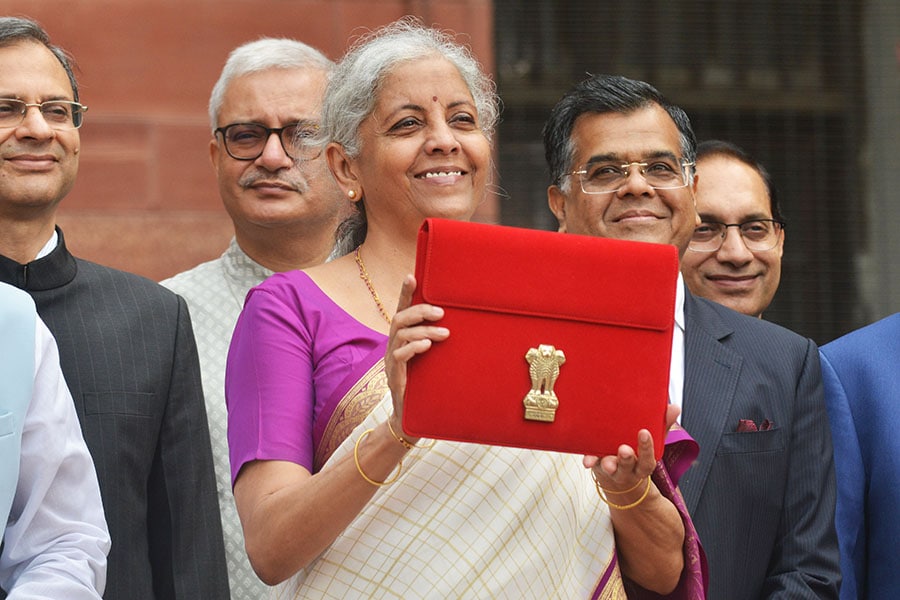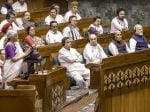Budget 2024: Appeasement to alliance parties, energy transition strategies, job creation in focus
Budget 2024 was a bit of a shock for investors due to the changes to the capital gains taxes but the direction to growth reforms remains intact, say experts
 Indian Finance Minister Nirmala Sitharaman (C) holds a folder containing Union Budget documents outside the Ministry of Finance in New Delhi, India on July 23, 2024.
Image: Imtiyaz Khan/Anadolu via Getty Images
Indian Finance Minister Nirmala Sitharaman (C) holds a folder containing Union Budget documents outside the Ministry of Finance in New Delhi, India on July 23, 2024.
Image: Imtiyaz Khan/Anadolu via Getty Images
Appeasement would be one of the easy ways to describe what the government set out to do through its Budget FY25 presented in Parliament on Tuesday, during the third term of the ruling government. The capital expenditure for the year to March 2025 is kept unchanged at Rs 11.11 lakh crore, as announced during the interim budget and the direction towards lowering of fiscal deficit (as a percentage of GDP)—announced at 4.9 percent for FY25—appears to be in place.
What was slightly different was a range of measures from social welfare schemes and overall development of the states of Bihar and Andhra Pradesh—where the governments alliance partners come from—besides the states of West Bengal, Odisha and Jharkhand. The BJP won the recent assembly elections in Odisha. New airports, medical colleges, sports infrastructure and measures to improve irrigation and flood mitigation have all been announced.
Employment generation is an area where the Modi-led government has come in for criticism over the years and Sitharaman decided to tackle this issue by incentivising new hiring. A part of the provident fund payments for new employees will be paid by the government. While these are likely to play out in coming months, it does not necessarily mean a quick fix to income generation and boosting consumption demand in India, which is at a several-year low. There were no measures announced for specifically boosting consumption.
There was a rude shock for stock market investors, after Finance Minister Nirmala Sitharaman announced a small hike in long term capital gains tax and an increase in short-term capital gains tax to 20 percent, from the current 15 percent. Securities transaction tax for trades in the futures and options market was hiked.
While presenting the Budget, Sitharaman kept pointing out that her vision was for the long-term and that the measures being announced were with a five-year horizon. Take, for instance, the measures for MSMEs. Mudra loans saw an increased limit to Rs 20 lakh and MSMEs will now be able to take advantage of an insurance policy against defaults. This would make it more likely for banks to lend to them.
Also read: Budget 2024 spotlights agriculture, overall rural recovery
On the taxation front, the news for equity investors was negative. Short term capital gains tax for listed equity increased from the present 15 percent to 20 percent. For the long term, the rate moved up from the present 10 percent to 12.5 percent.
This sent the markets tumbling but they staged a smart recovery by the end of the day. The Sensex ended down 73 points after falling as much as 1,134 points intraday. For truly long term investors, the finance minister put in place a plan to start retirement accounts for their children. At age 18, the children could take care of the account.
“The announcement of focussed schemes to boost employment and skilling for over 4 crore young Indians, along with the direct benefit transfer scheme for those entering the workforce are necessary steps to tackle the rising concerns of unemployment in the country,” says Haigreve Khaitan, senior partner, Khaitan & Co.
He added that specific energy transition strategies and roadmaps across industries is another welcome step, sending a clear message that the government is reiterating its commitment to its ambitious clean energy goals. “We see a growth-oriented budget which has also provided some relief to taxpayers. While the initial market reaction was a bit of a dampener in light of the capital gains tax increase, there are several positive indicators one can take away when looking at the bigger picture,” Khaitan added.
Geo-political developments due to three wars across different regions across the globe will need to be closely monitored. For investors, both domestic and foreign, a lot would depend on how corporate earnings in coming quarters play out and the uptick to the local consumption demand for the economy.

















